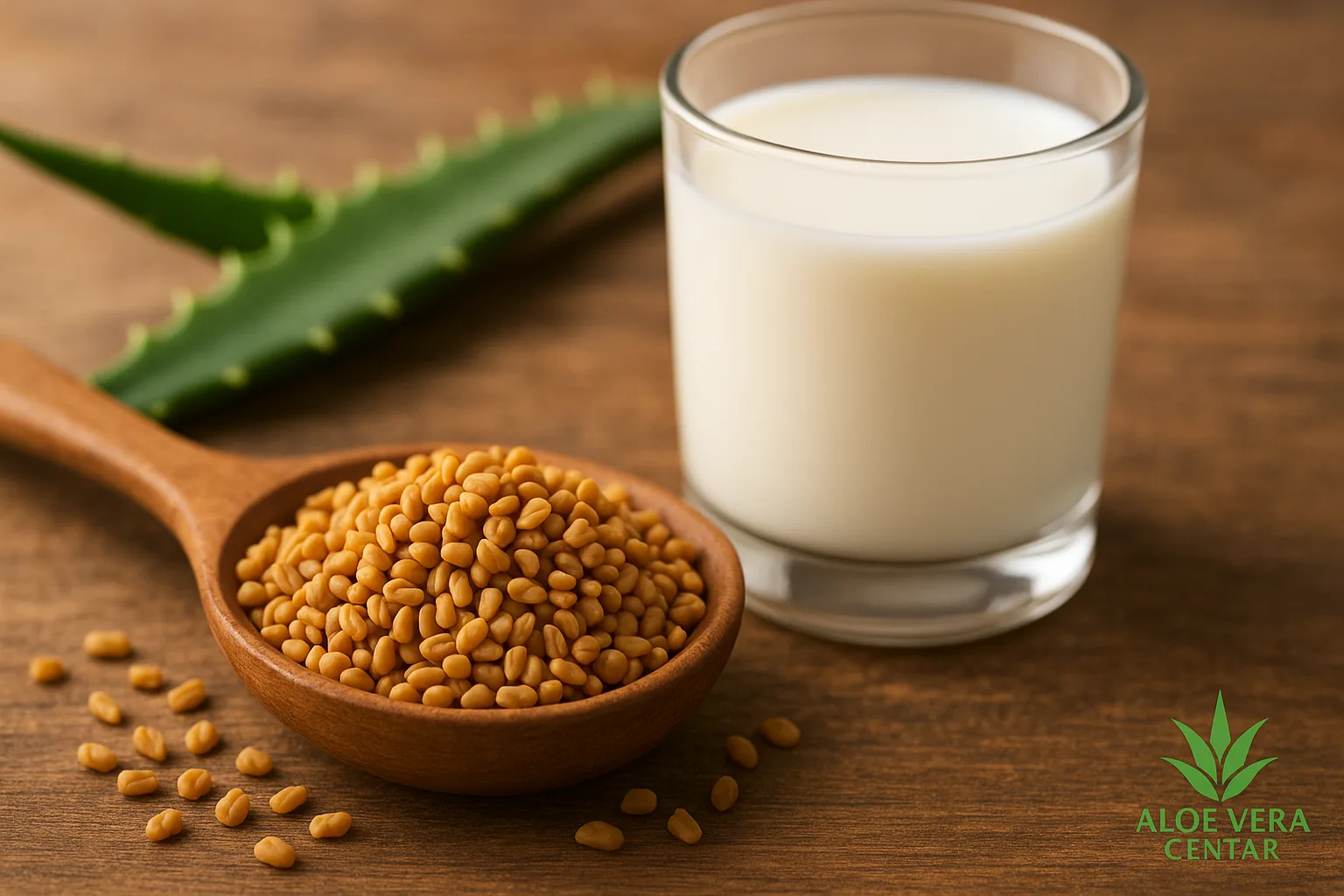
Fenugreek – how to Boost Breastfeeding and Control Blood Sugar
Fenugreek: Natural Ally for Breastfeeding, Stable Blood Sugar, and Healthy Digestion
Fenugreek may be a tiny spice seed, but it hides a vast arsenal of benefits for our body. If you’ve ever sought natural support for increased milk production, better glucose regulation, or relief from uncomfortable bloating – stay here. In the next few minutes, you’ll discover how this Mediterranean plant can address three common challenges of modern lifestyle.
What is Fenugreek and why is it Special?
Fenugreek (Trigonella foenum-graecum) belongs to the legume family. It has been used for centuries in Ayurveda and traditional Mediterranean cuisine, so it’s no wonder ancient Egyptians called it “green gold.” It’s rich in soluble fiber, plant proteins, and specific saponins (diosgenin) that give it therapeutic potential.
Nutritional Composition at a Glance
- 50% soluble and insoluble fiber
- 25% protein with essential amino acids
- Phytochemicals: diosgenin, trigonelline, and 4-hydroxy-isoleucine
- B-vitamins and minerals iron, magnesium, and zinc
You might wonder why? It’s precisely the synergy of fiber and saponins that explains why fenugreek affects breastfeeding, glucose, and digestion simultaneously.
Fenugreek as Breastfeeding Support
Sound too good? Here’s the deal: phytoestrogens from fenugreek mimic the hormone estrogen and stimulate prolactin secretion – the key hormone for milk production. One study showed that mothers who consumed 3g of fenugreek daily increased their milk supply by 34% in just two weeks.
How to Use It?
- Tea – pour 250ml of hot water over 1 teaspoon of seeds, let steep for 10 min, strain and drink twice daily.
- Tincture – 1ml of tincture up to three times per day.
- Capsules – 500mg capsules, two to three daily with meals.
Bucket brigade: But that’s not all – proper dosing also reduces the risk of infant colic because fenugreek passes into breast milk and gently soothes the baby’s intestines.
Stress-Free Blood Sugar Regulation
Sudden glucose spikes are a common problem with diets rich in refined carbohydrates. Soluble fiber from fenugreek slows sugar absorption, while 4-hydroxy-isoleucine stimulates insulin release. According to Healthline analysis, a daily intake of 10g of ground seeds three times daily can lower fasting glucose by 15-20%.
Practical tip: Sprinkle a spoonful of toasted seeds over salad or mix into a smoothie for slow glucose release.
Healthy Digestion and less Bloating
Bloating, heartburn, and slow peristalsis? Fenugreek comes to the rescue as its fiber swells in contact with water, creating a psyllium-like gel. This gel lubricates intestinal walls, stimulates bowel movement, and binds toxins.
Having diarrhea? Check out natural remedies for diarrhea where fenugreek is mentioned as a safe option alongside aloe and probiotics.
Mountain of attention: Here’s why this matters: healthy intestines mean stronger immunity, more energy, and better nutrient absorption.
Combine Fenugreek and Probiotics for Maximum Effect
While fiber feeds good bacteria, a quality probiotic supplement accelerates gut flora recovery. That’s why many of our readers choose Forever Active Pro B – a patented formula with 8 strains and 10 billion live cultures.
How to Properly Use Fenugreek at Home?
- Soaked seeds – leave 1 tablespoon overnight, chew the soaked seeds on an empty stomach in the morning.
- Powder in yogurt – ½ teaspoon of powder in Greek yogurt or natural laxatives smoothie.
- Sprouts – for enzyme-rich salads.
Safety notes: Avoid fenugreek during pregnancy as high saponin intake may trigger contractions. If taking antidiabetics, monitor glucose to avoid hypoglycemia.
FAQ – Frequently Asked Questions
1. How Quickly Does Fenugreek Increase Milk Supply?
Most nursing mothers notice improvement within 48-72 hours, but full effect occurs after 10-14 days of regular use.
2. Can Fenugreek Lower Cholesterol?
Yes. Soluble fiber binds bile acids and reduces cholesterol absorption, which can lower LDL and triglycerides long-term.
3. Are there any Side Effects?
Some users report mild nausea or a maple syrup-like body odor. Reduce the dose and drink plenty of water.
Conclusion
Fenugreek is a multipurpose natural supplement that can facilitate breastfeeding, stabilize blood sugar, and balance digestion. If you want personalized advice, use our AI advisor to check which doses are ideal for you. And when you decide to try fenugreek or supplements like probiotics, get 15% off on your first order. Your digestion, energy, and calmer days – begin now!
Related Readings and Additional Support
Fenugreek strongly affects digestion and metabolism, as well as hormonal balance. If you want to learn more about naturally boosting mood, read the article about happiness hormones and how diet, exercise, and aloe vera can influence serotonin balance.
For those whose primary goal is healthier digestion and a flat stomach, the guide healthy digestion meal plan is useful – with steps and examples of how to create a menu that supports gut flora.
Of course, body care doesn’t stop at internal balance. You can further support skin care with natural peeling. Find ideas and recipes in the text natural body scrub.
If you want to make a bigger body “reset”, check out the DX4 program – a four-day plan combining aloe, nutritional support, and mindful practice.
For additional liver protection and detoxification help, learn about milk thistle and silymarin – a supplement often combined with fiber and herbal extracts like fenugreek.
By combining fenugreek, targeted nutrition, quality care, and detox support, you build a holistic approach to health – from digestion and hormones to skin and energy.
Note: This article serves as educational content and is not a substitute for professional medical advice. Always consult a doctor or qualified professional for specific health issues.








